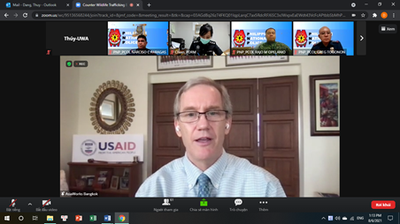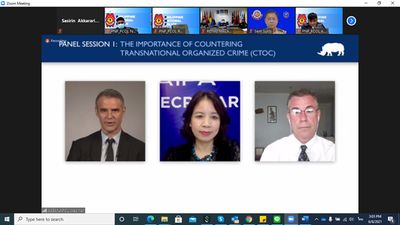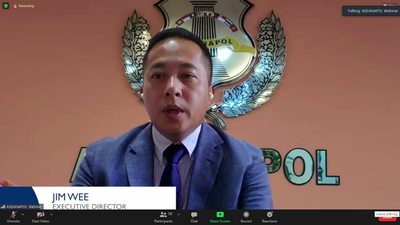ASEAN’s Top Law Enforcement Leaders Target Wildlife Crime as a Serious Transnational Crime
At the event, the police chiefs worked on a Wildlife Crime Resolution for ASEANAPOL adoption to enhance cooperation, capacity building, promotion of wildlife demand reduction campaigns, and information sharing to collaboratively address transnational wildlife crimes.
The meeting further advanced USAID’s collaborative Countering Transnational Organized Crime (CTOC) model to counter wildlife trafficking. To date, a total of 420 operational level law enforcement officers -- including customs, police, wildlife and forestry authorities, prosecutors, and financial crime investigators from the region as well as from African countries, have completed USAID Wildlife Asia’s CTOC courses. However, the law enforcement officers stressed the need for buy-in from their commanding officers to integrate and implement the new techniques and approaches they had learned in order to support effective wildlife crime investigations.
 "The U.S. government is fully committed to its partnership with the ASEAN regional and national leadership to combat illegal wildlife crimes -- to uphold the rule of law and regional stability that underpins a free and open Indo-Pacific region. Now in its fifth year, the Eliminate, Neutralize, and Disrupt Wildlife Trafficking Act, or END Act has enabled many U.S. government agencies to be better coordinated in these efforts. These efforts are in alignment with USAID’s latest Regional Development Cooperation Strategy for Asia, which includes the objective of reducing transnational environmental crime," said Steven G. Olive, Mission Director for USAID/Regional Development Mission for Asia.
"The U.S. government is fully committed to its partnership with the ASEAN regional and national leadership to combat illegal wildlife crimes -- to uphold the rule of law and regional stability that underpins a free and open Indo-Pacific region. Now in its fifth year, the Eliminate, Neutralize, and Disrupt Wildlife Trafficking Act, or END Act has enabled many U.S. government agencies to be better coordinated in these efforts. These efforts are in alignment with USAID’s latest Regional Development Cooperation Strategy for Asia, which includes the objective of reducing transnational environmental crime," said Steven G. Olive, Mission Director for USAID/Regional Development Mission for Asia.
The United States Government’s USAID Wildlife Asia Program is deterring wildlife crime and protecting endangered species from extinction by partnering with Southeast Asian countries to strengthen counter wildlife trafficking laws, arrest and prosecute criminals, and reduce demand for wildlife products through pioneering consumer campaigns.
The region’s top law enforcement leaders also delivered opening remarks: Royal Malaysia Inspector General of Police, Dato’ Sri Acryl Sani Bin Haji Abdullah Sani, and the current ASEANAPOL Chairman, Police Major General Do Van Hoanh, Director General of the Office of Investigation Police Agency of the Vietnamese Ministry of Public Security.
The main topics of discussion included: the importance of adopting models and approaches such as the CTOC to dismantle organized criminal syndicates involved in wildlife crime and wildlife trafficking; the need to support, enhance and sustain joint transnational investigations and cooperation; and the necessity of securing high-level political will to support operational law enforcement officers effectively combat wildlife crime. Presenters and panelists included representatives from the U.S. Fish and Wildlife Service, U.S. Department of Justice, the U.S. Bureau of International Narcotics and Law Enforcement Affairs, INTERPOL, the United Nations Office on Drugs and Crime, Royal Thai Police, Royal Malaysian Police, ASEAN Inter-Parliamentary Assembly, Thailand’s Anti-Money Laundering Office, and non-governmental organization Freeland.  High-level police leaders from China also attended the event as an ASEANAPOL Dialogue Partner.
High-level police leaders from China also attended the event as an ASEANAPOL Dialogue Partner.
“ASEANAPOL takes wildlife crime seriously, along with illicit drug trafficking, trafficking in persons, and cybercrimes, which are the key crimes we are focusing on in 2020-2021,” said ASEANAPOL Secretariat Executive Director, Deputy Assistant Commissioner Jim Wee in his closing remarks.
ASEANAPOL, with its mission “Preventing and Combatting Transnational Crime Through A Greater Nexus and Creative Policing Collaboration,” is emphasizing building the capacity of its Member Countries in combating transnational organized crimes by facilitating and coordinating counter transnational crime efforts, initiating and supporting communication, and strengthening networks.#


